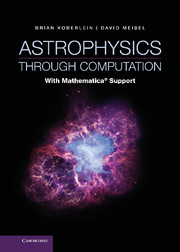7 - Astrophysical plasmas
Published online by Cambridge University Press: 05 June 2014
Summary
It is evident from observation that most of the interstellar medium is permeated with charged particles and permanent magnetic fields. If the ionization in a particular region is complete (no neutral particles) the gas is called a plasma. Thus, interstellar space is always a low density, nearly collisionless, environment where particles may go centuries without encountering a particle of the same kind. It is most certainly dominated by a plasma or at least a highly ionized gas. In this chapter we consider the behavior of light and electric charges in such plasmas in a variety of situations. We will typically use protons and electrons as test particles.
Many treatments of plasmas in astrophysics consider only “cold,” virtually collisionless plasmas, but there are a number of instances, particularly in the vicinity of stars and protostars, where one must examine higher density, higher temperature situations. A cold plasma is one in which the kinetic motion of the protons and electrons generally can be ignored. For warm plasmas, electron and ion temperature becomes a contributing factor and we must take kinetic theory into account via the Maxwell–Boltzmann equation (MBE). Finally we look at two diverse, but actually closely related, applications of plasma theory in astrophysics, the first using pulsars to map the electron density and magnetic field within the Milky Way galaxy, the second being a model of solar wind.
- Type
- Chapter
- Information
- Astrophysics through ComputationWith Mathematica® Support, pp. 220 - 262Publisher: Cambridge University PressPrint publication year: 2013

